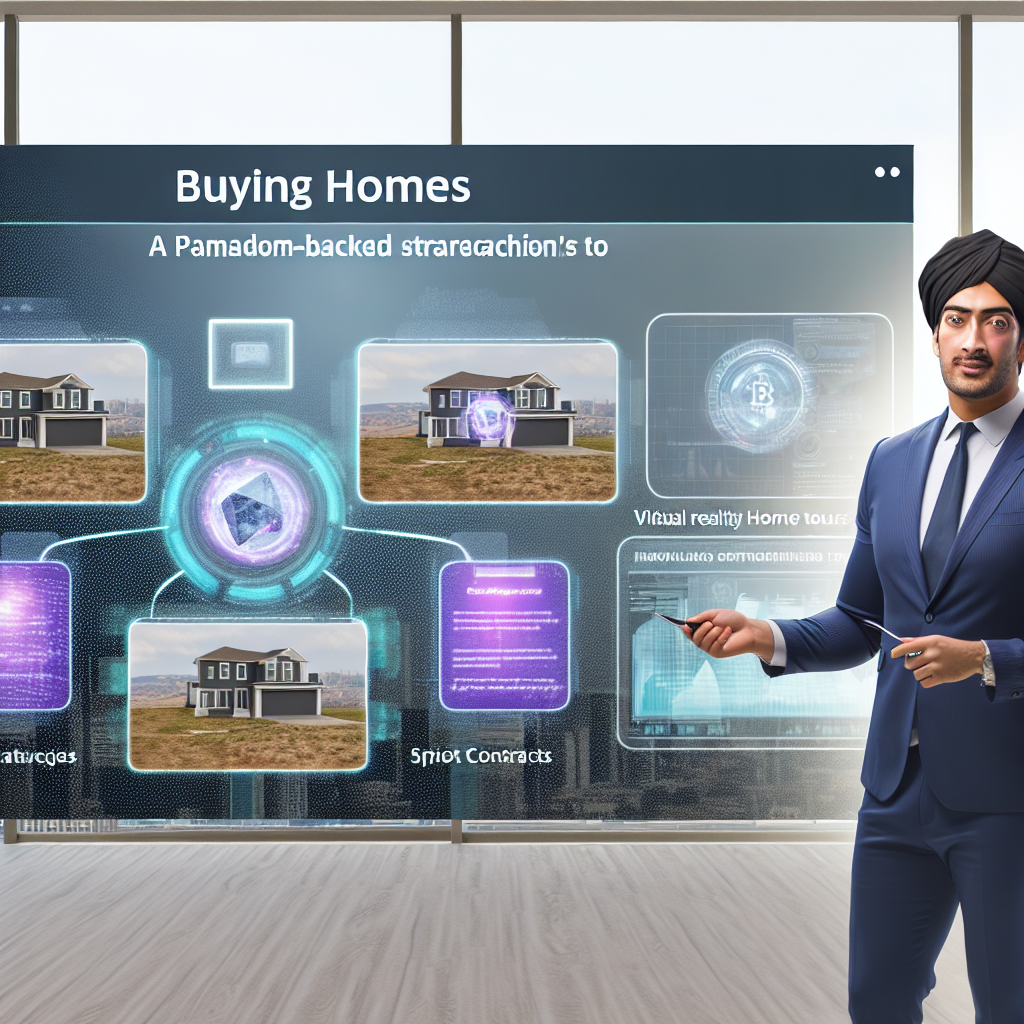Overview of PropTech
Definition of PropTech
PropTech, or property technology, refers to the application of technology in the real estate sector.
This innovative approach streamlines processes related to property management and transactions.
Moreover, it enhances the overall customer experience in home buying and selling.
Scope of PropTech in the Real Estate Market
The scope of PropTech addresses multiple areas within the real estate market.
It encompasses property management, real estate sales, and investment analysis.
Additionally, PropTech plays a crucial role in facilitating efficient communication between parties.
Key Innovations in PropTech
Several key innovations drive the PropTech revolution.
- Virtual reality (VR) allows for immersive property tours.
- Big data analytics provides insights into market trends.
- Blockchain technology enhances the security of transactions.
- Online listing platforms simplify the buying process.
Impact on Home Buying
PropTech innovations significantly impact the home buying process.
They empower buyers with more information and resources than ever before.
Furthermore, easier access to listings accelerates decision-making.
Additionally, these technologies often reduce transaction times and costs.
Key PropTech Innovations Transforming the Home Buying Process
Virtual Reality Tours
Virtual reality tours provide immersive experiences for home buyers.
They allow potential buyers to explore properties remotely.
This technology saves time and increases engagement.
Moreover, it helps buyers visualize space more effectively.
Transform Your Real Estate Decisions
Unlock personalized real estate insights crafted just for you. Get actionable advice designed to amplify your success.
Get StartedAs a result, they can make informed decisions faster.
AI-Powered Property Recommendations
Artificial intelligence transforms how buyers find homes.
AI algorithms analyze preferences and suggest listings.
This technology tailors suggestions based on individual needs.
It enhances the user experience significantly.
Consequently, buyers discover suitable options with ease.
Blockchain for Secure Transactions
Blockchain technology offers enhanced security for property transactions.
This innovation reduces fraudulent activities in real estate.
Smart contracts streamline the buying process efficiently.
Moreover, blockchain records every transaction transparently.
This fosters trust among buyers and sellers alike.
Online Mortgage Pre-Approval
Online platforms simplify the mortgage pre-approval process.
Buyers can get approved within minutes, improving efficiency.
This access helps buyers understand their budgets quickly.
Showcase Your Real Estate Business
Publish your company profile on our blog for just $200. Gain instant exposure and connect with a dedicated audience of real estate professionals and enthusiasts.
Publish Your ProfileAs a result, they can focus on suitable properties sooner.
Additionally, it connects buyers with lenders instantly.
Mobile Apps for Home Search
Mobile applications revolutionize home searching capabilities.
These apps provide instant access to listings on-the-go.
Users can filter results based on specific criteria easily.
Push notifications keep buyers updated on new listings.
Hence, they never miss out on potential opportunities.
The Role of Virtual Reality in Home Tours and Buyer Experience
Enhancing Home Tours with Virtual Reality
Virtual reality (VR) transforms the way buyers view homes.
Buyers can explore properties from the comfort of their homes.
This technology eliminates geographical barriers and time constraints.
Moreover, VR home tours provide realistic, immersive experiences.
They allow potential buyers to visualize spaces in 3D.
This helps them understand room dimensions and layouts better.
Improving Buyer Engagement
Virtual reality increases buyer engagement significantly.
It captivates users and encourages them to explore further.
As a result, potential buyers are more likely to schedule in-person visits.
Engaged buyers exhibit greater confidence in their decisions.
Streamlining the Home Buying Process
VR expedites the home buying process effectively.
Buyers can narrow down their choices before visiting properties physically.
This streamlining reduces time spent on house hunting.
Additionally, it lowers the stress associated with the buying process.
Innovations and Future Trends
Emerging VR technologies continue to shape the market.
For instance, some companies offer interactive virtual staging.
This allows buyers to visualize furniture and décor in spaces.
Furthermore, advancements in VR will enhance user experience.
Promising Future for Home Buying
Virtual reality plays a vital role in home buying.
Its impact on tours and buyer experiences is profound.
This technology not only transforms engagement but also streamlines processes.
As innovations progress, the future looks promising for home buying.
Discover More: Streamlining Real Estate Processes With PropTech Platforms
Showcase Your Real Estate Business
Publish your company profile on our blog for just $200. Gain instant exposure and connect with a dedicated audience of real estate professionals and enthusiasts.
Publish Your ProfileHow Big Data and Analytics Enhance Property Valuation and Market Trends
The Role of Big Data in Real Estate
Big data plays a crucial role in today’s real estate market.
It enables professionals to gather and analyze vast amounts of information.
This data includes property prices, neighborhood statistics, and market trends.
Consequently, agents can make informed decisions based on current data.
Moreover, big data can predict future buying trends effectively.
Analytics Tools in Property Valuation
Various analytics tools help in accurately valuing properties.
For example, machine learning algorithms can assess numerous factors.
These factors include square footage, location, and recent sales.
Furthermore, predictive analytics can forecast price changes over time.
This empowers buyers and sellers to strategize effectively.
Improving Market Trend Predictions
Big data facilitates understanding market dynamics rapidly.
Real-time data analysis provides actionable insights for investors.
These insights help illuminate upcoming real estate trends.
For instance, seasonal shifts and economic factors significantly influence buyer behavior.
This knowledge allows stakeholders to position themselves advantageously.
Case Studies: Successful Implementations
Real estate firms have successfully integrated big data into their operations.
Tech-driven companies, like Zillow, offer unique insights on market trends.
Additionally, platforms like Redfin leverage analytics for data-driven decisions.
These firms showcase the potential of big data in enhancing customer experiences.
Challenges and Considerations
Despite its advantages, big data also presents challenges.
Data privacy issues remain a major concern for stakeholders.
Additionally, not all data sources are reliable or accurate.
Hence, real estate professionals must evaluate data critically.
Adopting best practices will better mitigate these risks.
You Might Also Like: How Artificial Intelligence Is Making Property Valuations More Accurate
Automating Transactions: The Impact of Blockchain Technology on Real Estate Deals
Introduction to Blockchain Technology
Blockchain technology plays a crucial role in today’s digital economy.
This innovative technology enables secure and transparent transactions.
Furthermore, it has the potential to transform the real estate sector.
Streamlining the Buying Process
Blockchain simplifies the home buying process considerably.
It eliminates the need for cumbersome paperwork.
Showcase Your Real Estate Business
Publish your company profile on our blog for just $200. Gain instant exposure and connect with a dedicated audience of real estate professionals and enthusiasts.
Publish Your ProfileSellers and buyers can interact directly on the blockchain.
This increases efficiency during transactions.
Enhancing Security and Trust
Security is paramount in real estate transactions.
Blockchain technology ensures that data remains safe from tampering.
Every transaction is recorded in a decentralized ledger.
Consequently, this provides an immutable record of ownership.
Reducing Costs and Time
Another significant advantage of blockchain is cost reduction.
It minimizes the need for intermediaries like brokers and agents.
This leads to lower overall transaction fees.
Additionally, transactions complete much faster compared to traditional methods.
Promoting Transparency
Blockchain enhances transparency in real estate deals.
All stakeholders have access to the same information in real-time.
This shared visibility fosters greater trust among parties.
Moreover, it reduces the likelihood of fraud.
Challenges and Considerations
Despite its advantages, blockchain adoption faces challenges.
Regulatory compliance is a significant concern for many stakeholders.
Additionally, the technology requires education for industry professionals.
Understanding blockchain is vital to leverage its full potential.
Future Prospects in Real Estate
The future of blockchain in real estate looks promising.
Emerging PropTech companies are actively exploring innovative applications.
As these technologies evolve, home buying experiences will likely improve.
Overall, blockchain could reshape the entire real estate landscape.
Uncover the Details: Blockchain in Real Estate: How It’s Revolutionizing Property Transactions
Integration of AI and Machine Learning in Personalized Home Search Experiences
Enhancing User Experience
AI and machine learning significantly enhance the home buying experience.
They analyze user preferences to present tailored property suggestions.
This approach creates a more engaging and efficient search process.
Moreover, it saves time by filtering out irrelevant listings.
Data-Driven Insights
Advanced algorithms gather data from various sources.
They evaluate market trends, pricing patterns, and neighborhood dynamics.
Consequently, buyers receive informed recommendations and insights.
Showcase Your Real Estate Business
Publish your company profile on our blog for just $200. Gain instant exposure and connect with a dedicated audience of real estate professionals and enthusiasts.
Publish Your ProfileThis data-driven approach increases the chances of finding ideal homes.
Continuous Learning and Adaptation
AI systems continually learn from user interactions.
This ensures increasing accuracy in future property suggestions.
As users refine their preferences, the system adapts accordingly.
Ultimately, this leads to a more refined home search experience.
Streamlined Communication
Chatbots powered by AI facilitate instant communication between buyers and agents.
These tools answer queries promptly and efficiently.
Moreover, they can schedule tours or provide additional information instantly.
This streamlines the home buying process significantly.
Predictive Analytics for Better Decisions
Machine learning models can predict future property values.
These predictions assist buyers in making informed investment decisions.
Additionally, they help assess risk factors associated with properties.
As a result, buyers can strategize their purchases effectively.
Explore Further: The Growing Role of Big Data in Real Estate Market Analysis

The Rise of Digital Platforms
Simplifying Communication Between Buyers and Agents
The home buying process can often be overwhelming.
However, technology is changing that narrative.
Digital platforms are now essential tools for home buyers.
These platforms streamline communication significantly.
For example, buyers can connect directly with real estate agents.
Furthermore, these platforms allow instant messaging features.
This enables quicker responses to queries and concerns.
Additionally, many platforms offer video chat options.
Thus, face-to-face interactions occur despite physical distance.
Moreover, these digital tools provide access to numerous listings.
Buyers can effortlessly browse homes from the comfort of their own space.
This transparency reduces the time spent searching for properties.
Most platforms also include detailed property information.
Buyers gain insights into neighborhoods, amenities, and prices.
As a result, informed decisions become easier to make.
In addition, many platforms enable virtual tours of homes.
Showcase Your Real Estate Business
Publish your company profile on our blog for just $200. Gain instant exposure and connect with a dedicated audience of real estate professionals and enthusiasts.
Publish Your ProfileThis feature enhances the viewing experience tremendously.
Moreover, buyers can access reviews and ratings for agents.
This builds trust and empowers buyers in their choices.
Finally, technological innovations continue to evolve this space.
These changes ensure a more efficient home buying experience.
There is no going back to the old ways of real estate transactions.
Challenges and Considerations: Cybersecurity in PropTech Solutions
Understanding Cybersecurity Risks
Cybersecurity threats constantly evolve in the PropTech landscape.
Hackers may target sensitive information in real estate transactions.
Data breaches can replace trust with apprehension among users.
Additionally, incidents may complicate regulatory compliance for companies.
Implementing Robust Security Measures
Effective cybersecurity begins with strong user authentication protocols.
Multi-factor authentication significantly enhances account protection.
Moreover, end-to-end encryption ensures data integrity during transmission.
Regular security audits help identify vulnerabilities in PropTech systems.
Educating Users on Cyber Hygiene
User awareness plays a critical role in preventing security incidents.
Implementing training programs fosters a culture of cybersecurity vigilance.
Encouraging users to create unique passwords further safeguards sensitive data.
Additionally, notifying users about phishing attempts can minimize risks.
Collaborative Efforts in Cybersecurity
Collaboration among industry players strengthens overall security posture.
Sharing threat intelligence can help organizations anticipate risks.
Creating partnerships with cybersecurity firms enhances protective measures.
Furthermore, leveraging blockchain technology may improve data transparency.
Regulatory Compliance and Standards
Staying compliant with regulations is essential for PropTech companies.
Adhering to data privacy laws fosters trust among consumers.
Continuous monitoring of regulatory changes ensures swift compliance efforts.
Implementing industry best practices reinforces data protection strategies.
Future Trends in PropTech and Their Potential Effects on Home Buying in the USA
Emergence of Artificial Intelligence
Artificial intelligence will reshape the home buying process dramatically.
AI algorithms can analyze buyer preferences quickly.
Consequently, they provide tailored property recommendations.
This technology enhances the efficiency of virtual tours.
Showcase Your Real Estate Business
Publish your company profile on our blog for just $200. Gain instant exposure and connect with a dedicated audience of real estate professionals and enthusiasts.
Publish Your ProfileBuyers can experience homes remotely through immersive AI simulations.
Blockchain Technology’s Impact
Blockchain introduces unprecedented security in transactions.
It enables transparent and efficient property transfers.
Smart contracts can automate deal processes effectively.
Moreover, this technology reduces the need for intermediaries.
As a result, buyers can save on closing costs.
Virtual and Augmented Reality Trends
Virtual reality transforms home viewing experiences significantly.
Prospective buyers can tour homes from anywhere in the world.
Augmented reality allows for interactive home staging.
This enhances buyers’ imagination and decision-making.
In addition, these technologies reduce time spent in person.
Sustainability and Smart Homes
The trend towards sustainability is gaining momentum.
Smart technology helps manage energy consumption efficiently.
Eco-friendly features increasingly attract environmentally conscious buyers.
Homes equipped with green technology often see faster sales.
Furthermore, buyers value energy savings over the long term.
Increased Use of Data Analytics
Data analytics is crucial for market trend prediction.
Real estate professionals can offer insights based on data trends.
This empowers buyers to make informed decisions swiftly.
Additionally, data helps identify emerging neighborhoods.
Investors can strategize based on analysis of property values.
Integration of FinTech Solutions
The integration of financial technology simplifies mortgage processes.
Streamlined applications reduce time and paperwork significantly.
FinTech platforms offer transparent comparison of mortgage rates.
Moreover, they provide first-time buyers with tailored options.
This accessibility fosters an informed purchasing environment.
Additional Resources
What Is Proptech and How It Changed the Real Estate Industry
Proptech Success Stories: Case Studies and Innovations – MIPIM …




